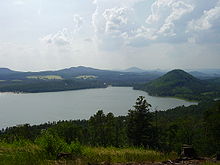Máj

Máj , German May , is a romantic epic by Karel Hynek Mácha published in 1836 . It is considered one of the most outstanding works in Czech literature .
content
Jarmila (Jarmilla) is expecting her lover Vilém (Wilhelm) under an oak tree by a lake on the evening of May 1st. In his place, an acquaintance appears who tells her that her lover is threatened with execution and that she is to blame. On the other side of the lake, the robber chief Vilém is imprisoned in a tower. He slew his rival and thus, without knowing it, murdered his father who had driven him out as a child. He laments his unfortunate fate and faces inevitable and ultimate death. He confides in the guard, who is deeply shaken by the young man's suffering. The next morning, Vilém is led to the place of execution accompanied by a praying crowd. Nature frames the scene in all its beauty and is forever lost to the condemned. He is beheaded, his head is put on a pole and his body is tied to a wheel. Seven years after the event, a hiker named Hynek comes to this place and sees the bones. He learns the story in an inn and many years later the hiker returns to the place on the first of May.
Structure and verse
Máj is divided into four canti and two intermezzi . The rhyme scheme is mostly abba, the verses are mostly tetrameters . The consistently used iambic was until then entirely uncommon in the Czech poetry.
reception
Mácha self-published Máj. The contemporary criticism misjudged the work and categorically rejected it. Josef Kajetán Tyl praised Mácha's linguistic style, but criticized the fact that the work had no national claim. Only the following generations discovered Mácha as a literary genius and role model. The Májovci , an important group of writers from the second half of the 19th century, have the work title in their name.
Máj was translated into German soon after it was published. The following translations are available: Siegfried Kapper (1844), Alfred Waldau (1862), Karl Müller (1882), Eduard Neumann (1933), Otto F. Babler (1983), Ondřej Cikán (2012).
expenditure
- Karel Hynek Mácha: May . Labor, Vienna 2012, ISBN 978-3-902800-04-6 .
Individual evidence
- ↑ Walter Schamschula . History of Czech Literature. From Romanticism to the First World War (Volume II). Cologne 1996, p. 13f.